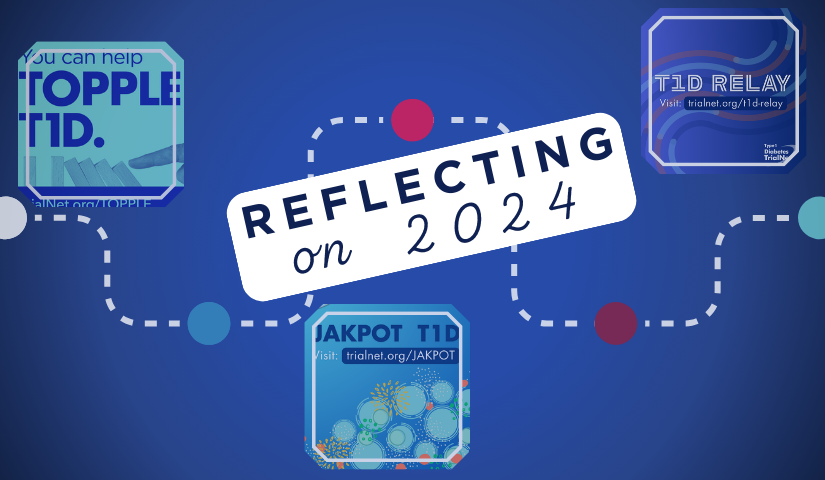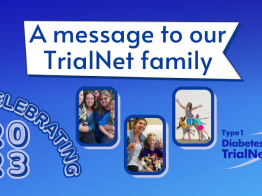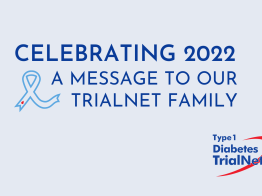
Reflecting on 2024 with TrialNet Chair Kevan Herold, MD
As we begin a new year, it’s the perfect time to celebrate our accomplishments. We recently spoke with TrialNet Chair Kevan Herold, MD, to get his insights on the past year and plans for the year ahead. Dr. Herold is a professor of immunobiology and medicine at Yale University, one of 17 TrialNet Clinical Centers at the forefront of type 1 diabetes research.
What TrialNet accomplishment from the past year do you believe has the greatest potential to impact the future of type 1 diabetes research?
Dr. Herold: TrialNet surpassed a major milestone in 2024: screening a quarter of a million people for type 1 diabetes. That’s a huge accomplishment in and of itself! But even more important is the fact that the data researchers collected during these screenings has led to numerous discoveries, including the stages of type 1 diabetes. Staging allows us to identify who will develop the disease prior to symptoms and provides the opportunity to change the course of the disease. For example, staging was used to identify participants in TrialNet’s Teplizumab Prevention Study, which led to approval of the first treatment to delay the onset of type 1 diabetes. For the first time since the discovery of insulin over 100 years ago, we have identified a new therapy that can change the course of the disease.
But going back to screening, it’s also important to note that the impact of our screening initiative is spreading around the world. Some of our colleagues in Europe were already conducting screening programs, but now there’s even more interest. For example, in Italy it’s now legally required to screen all children for type 1 diabetes. And here in the U.S., the ADA’s [American Diabetes Association] clinical practice recommendations now advise screening relatives of people with type 1 diabetes. Identifying people at the earliest stages allows us to intervene to change the course of the disease, and we’re moving in that direction.
Looking ahead to 2025, what TrialNet initiatives are you most excited about?
Dr. Herold: I’m very excited about two current studies that should reach their enrollment goals this year.
T1D RELAY is testing two immune therapies-- rituximab-pvvr followed by abatacept-- to learn if the combination can extend insulin production in people who are newly diagnosed with type 1 diabetes. Combination therapy is the new frontier for T1D research and TrialNet is leading the field here.
We also expect the JAKPOT T1D Study to reach its enrollment goal. This study is testing two autoimmune treatments called Janus kinase (JAK) inhibitors to see if either or both can preserve insulin production in people recently diagnosed with type 1 diabetes. Just last year, our colleagues in Australia reported that another JAK inhibitor was able to slow disease progression in people newly diagnosed.
I think it’s important that we’ve moved away from this idea that we’re going to find one treatment that will cure this disease. It’s not that easy. We need to think about the disease as a chronic autoimmune disease, but it’s a chronic autoimmune disease that we can change and prevent.
Our goal is to build on prior discoveries that will allow us to add new treatment options, and we have several studies in the pipeline aiming to do just that.
What do you see as TrialNet’s role in the overall advancement of type 1 diabetes research?
Dr. Herold: One of TrialNet’s strengths is that our investigators know this field backwards and forwards — not just the immunologic aspect of it, but also the other parts of it, including insulin pumps, continuous glucose monitors, and latest treatments. They are skilled clinicians conducting translational research. Our investigators are uniquely skilled when it comes to understanding how what we’re doing fits into the broader landscape of treatment and prevention of type 1 diabetes.
Is there anything you’d like to add?
Dr. Herold: In closing, I want to thank each person who has taken part in a TrialNet study, their families, and our research teams. Without them none of our accomplishments would have been possible. And I absolutely believe what we’ve learned will lead to more therapies and combinations of therapies that will completely change the landscape of this disease.
2024: The year in review
Screening and Monitoring:
- Surpassed a major milestone for the Pathway to Prevention Study: More than 250,000 people screened for the early stages of T1D.
- Newly appointed Pathway to Prevention Study Chair Laura Jacobsen led the implementation of new strategies to expand screening and monitoring.
- Offered screening at dozens of community events for families impacted by T1D.
- Continued to offer the Long-term Investigative Follow-Up in TrialNet Study (LIFT) to anyone in a TrialNet prevention study who develops T1D, as well as participants in studies for people newly diagnosed with T1D when the study ends. To date, more than 600 people have taken part in LIFT. In addition to providing continued access to TrialNet teams at the forefront of T1D research, LIFT helps researchers understand the long-term benefits of clinical trial participation.
Clinical Studies
- Completed the TOPPLE Study, a Phase 1 study testing the safety and dosing of a new treatment in adults with T1D. Findings will be published in 2025.
- Published 10 scientific articles in prestigious peer-reviewed journals, including Diabetologia, Diabetes Care, Frontiers in Immunology and the Journal of Clinical Endocrinology and Metabolism.
2025 and beyond
- Two studies are projected to meet their enrollment goals in 2025:
- T1D RELAY needs only 7 more people to reach our enrollment goal of 74. This study is testing two established immune therapies—rituximab-pvvr infusions followed by abatacept injections—to see if the combination can preserve insulin production in people recently diagnosed with T1D.
- We have enrolled 33 of the 78 people needed for the JAKPOT T1D Study. This study is testing abrocitinib and ritlecitinib, two autoimmune treatments called Janus kinase (JAK) inhibitors, to see if a daily pill can preserve insulin production in people recently diagnosed with T1D.
- New studies in the pipeline for people at risk for T1D and for those newly diagnosed will build on prior discoveries and allow us to add new treatment options.
- Additional plans include gathering feedback from the broader T1D community to better inform TrialNet initiatives and make it easier to participate in clinical trials.
Join us in our mission to stop T1D
If you have a family member with T1D, you can benefit from risk screening through the Pathway to Prevention Study. Screening can detect diabetes-related autoantibodies that signal the early stages of T1D years before symptoms appear. TrialNet offers three convenient screening options: an in-home test kit, a test kit to take to a participating lab, or in-person screening at a TrialNet site.
If you’ve been screened outside of TrialNet and tested positive for T1D antibodies, you can also contribute to T1D research. When you are rescreened by TrialNet, you’ll learn if you are eligible to participate in clinical trials.
And everyone can help advance T1D research by helping to spread the word about TrialNet screening and clinical studies by sharing this e-newsletter and our social media posts. To stay up to date, be sure to follow us on Facebook, Instagram, and X.







